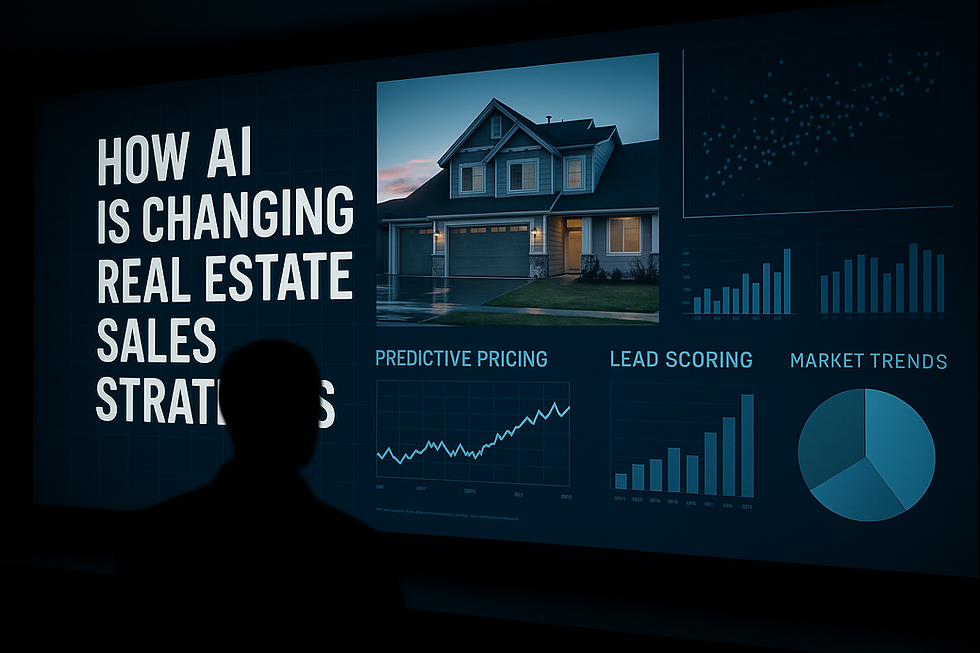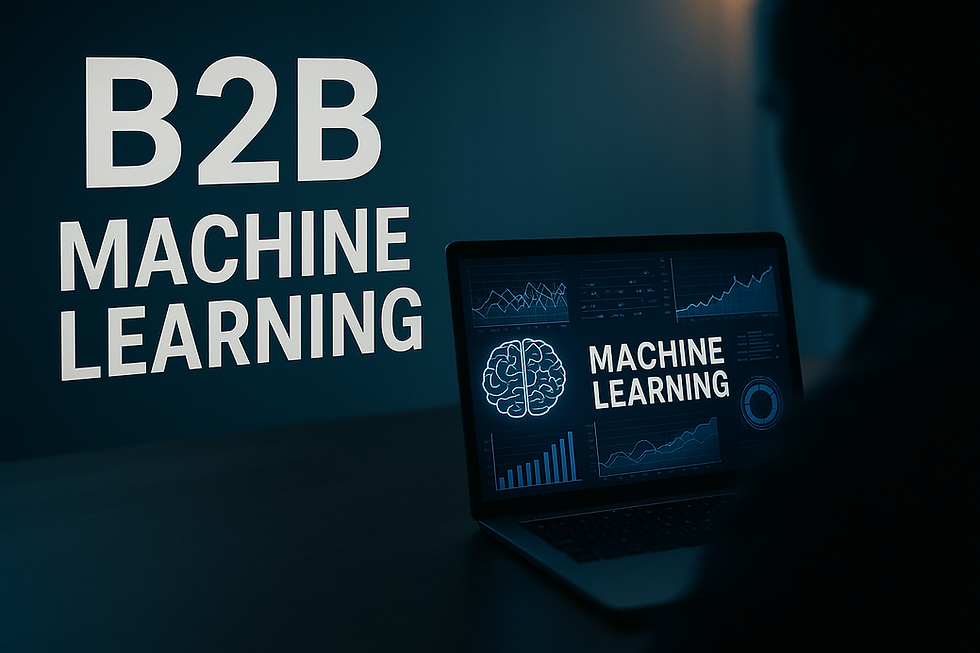How AI is Changing Real Estate Sales Strategies
- Aug 19, 2025
- 6 min read

How AI is Changing Real Estate Sales Strategies
No fluff. No warm-up. Let’s get straight to it.
Real estate is not what it used to be. Forget the days when sales agents relied on gut feeling, postcards, or weekend open houses alone. We are living in a time where artificial intelligence is rewriting every single page of the real estate sales playbook—and it’s doing it with data, speed, and brutal precision.
And it’s not a trend. It’s a transformation. From hyper-personalized property recommendations to real-time pricing predictions, AI in real estate sales is no longer a “nice-to-have”—it’s the competitive edge.
Let’s take you through this shift—backed by real data, real success stories, and no fluff at all.
Bonus: Machine Learning in Sales: The Ultimate Guide to Transforming Revenue with Real-Time Intelligence
Bonus Plus Pro: Machine Learning in Real Estate: The Silent Revolution Transforming Every Brick, Block, and Buyer
Real Estate Was Data-Rich But Insight-Poor
For decades, the real estate industry has been drowning in data—MLS listings, property histories, tax records, buyer demographics, and local market trends. But the tragedy was: nobody knew how to actually use it.
Agents spent hours scrolling through databases and doing repetitive tasks like:
Manually filtering listings
Guessing the right asking price
Cold-calling leads
Hoping for referrals
Today? Those same hours are handled by AI in milliseconds.
Predictive Pricing Is Not a Guess Anymore—It’s a Science
Let’s start with one of the most valuable tools AI brought to the table: predictive pricing.
Companies like Zillow and Redfin have integrated machine learning models that analyze:
Historical sale prices
Seasonal trends
Neighborhood appreciation rates
Nearby amenities
Buyer demand signals
Current mortgage rates
The result?
Zillow’s “Zestimate” algorithm processes more than 7.5 million statistical and machine learning models per day, trained on hundreds of millions of data points (source: Zillow AI Research, 2024). While previously it was often criticized, by 2023 it had achieved a median error rate of just 1.9% for on-market homes, according to Zillow’s published accuracy metrics.
Lead Scoring That Actually Converts
Before AI, agents had no idea which lead to call first. Now, AI-based lead scoring systems like those offered by kvCORE or BoomTown can rank prospects by how likely they are to convert.
They consider behaviors like:
Email open rates
Click-through rates on listings
Time spent on specific property types
Social media engagement
Scheduling behaviors
According to Inside Real Estate (2023), users of kvCORE’s AI lead engine experienced a 32% increase in lead conversion rates within the first 90 days.
Chatbots That Don’t Sleep—But Close
AI-powered chatbots such as Structurely and Rex have changed how leads are engaged. These bots are:
Available 24/7
Human-like in tone
Integrated with CRMs
Capable of scheduling viewings
Structurely claims their AI Assistants respond in less than 60 seconds, and keep up 6 to 10 touches per lead, with a response rate of 57%—far higher than human-initiated follow-ups.
And these aren’t bots just for the sake of automation. They qualify leads, answer listing questions, and even send dynamic property matches.
Smart CRMs Are the Agent’s New Brain
CRMs powered by machine learning now suggest:
The best time to contact a lead
What content to send next
Which property to pitch
Which buyer is going cold
Follow Up Boss, for example, uses predictive algorithms to send agents "Action Plans" tailored to individual clients based on behavior analytics. One user report from The Close (2023) noted that agents using the AI-assisted system booked 20% more appointments weekly.
Case Study: Compass and the AI Edge
Let’s talk about something massive and documented.
Compass, a tech-powered real estate brokerage, invested over $1 billion into its proprietary AI platform, built by engineers from Google, Facebook, and Microsoft.
Their tools include:
AI-powered “Collections” for collaborative buyer experiences
Price recommendation engines trained on over 30+ variables
Predictive algorithms to determine if a property is likely to sell soon
In Q2 2023, Compass revealed in their investor report that listings that used their full AI suite sold 19% faster and at an average 3.2% higher price than comparable listings not using the tech.
That’s not small. That’s billions in revenue at stake.
The Rise of Hyper-Targeted Marketing
With AI tools like Adfenix and Revaluate, agents can now micro-target segments like:
First-time buyers searching within a specific school district
Empty-nesters looking to downsize
Millennials ready to upgrade
AI uses psychographic analysis, online behavior, and lifestyle data. It doesn’t just target demographics—it predicts life stages.
Revaluate’s AI model even claims to identify homeowners most likely to move within 6 months, using over 200 individual data points including financial, behavioral, and social triggers.
And yes, it’s working. Agencies using Revaluate reported listing generation increases of up to 60%, according to their 2024 customer impact report.
Computer Vision: AI That “Sees” the Property
AI isn’t just about text and numbers—it now looks at photos too.
Restb.ai, EyeSpy360, and Zillow’s computer vision team are using image recognition to:
Detect home features (e.g. granite countertops, hardwood floors)
Classify room types
Tag photos with searchable metadata
Score photo quality for better listing presentation
This helps improve how listings are ranked and displayed to users—and increases clicks. Zillow confirmed in a 2023 internal data release that listings with AI-optimized photo tagging received 22% higher user engagement.
Automated Valuations: Not Just AVMs Anymore
Automated Valuation Models (AVMs) are being upgraded with deep learning.
HouseCanary, a real estate analytics firm, uses AI to generate property valuations by analyzing over 40 years of property data from 381+ metros across the U.S.
As of 2024, their models incorporate:
Macroeconomic indicators
Climate risk data
Infrastructure developments
Public transportation access
Their predictive accuracy on mid-term pricing (3-12 months out) achieved a 97.4% confidence score when back-tested on 2022–2023 price movements.
Case Study: Opendoor’s AI-Driven iBuying Engine
Opendoor, one of the pioneers of iBuying, runs almost entirely on AI.
They built a system that:
Assesses a home’s value within 2 minutes
Calculates repair costs using computer vision + inspection data
Automatically determines offer competitiveness
In 2023 alone, Opendoor processed over 100,000 homes using its algorithm, and according to their earnings call, 97% of offers made by the AI engine were within ±3% of the final sales price.
That’s machine learning with dollars on the line.
AI-Powered Sentiment Analysis in Real Estate Calls
Platforms like CallAction, Chime, and Voicera are analyzing tone, language, hesitations, and sentiment in agent-client conversations.
These tools help:
Identify buyer objections
Highlight missed follow-ups
Train junior agents using winning pitch patterns
Chime’s AI Coaching product reported that real estate agents using sentiment-based call feedback closed 18% more deals on average within the first quarter.
AI is Also Reducing Fair Housing Violations
Bias in real estate has long been a problem. In 2022, the National Fair Housing Alliance (NFHA) highlighted that AI—when used properly—can actually help detect and eliminate discriminatory practices.
Tools like Homebot and FHACompliant AI are now built with compliance logic that flags:
Biased language in listings
Unfair pricing disparities
Unequal targeting in advertising
This is where ethical AI is not just a buzzword—it’s enforcement.
Real Estate Agents Aren’t Getting Replaced—They’re Getting Upgraded
Let’s bust a myth. AI is not replacing agents. It’s making them more efficient, more data-driven, and way more competitive.
A 2023 study by the National Association of Realtors (NAR) found that agents who used at least three AI tools in their workflow earned 41% more commission on average than those who didn’t.
The same study revealed that 82% of buyers still want a human agent, but they expect that agent to have access to tech that speeds up the process.
Where It’s All Going: Real-Time, Predictive, Ethical, Hyper-Personalized Sales
We’re moving toward a future where:
Buyers are matched to homes before they even search
Prices adjust in real time based on demand patterns
Chatbots close deals faster than humans could follow up
Neighborhood value forecasts will be a common mobile notification
AI-driven compliance becomes a standard, not an add-on
And all of this is already in motion. Every month, new tools are coming out. Every quarter, more brokerages are onboarding AI at scale.
This isn’t about adapting anymore. This is about surviving.
Conclusion: This Is the Most Competitive Real Estate Has Ever Been
If you're in real estate and not using AI, you're not just behind—you’re invisible.
Everything is being optimized:
Every lead scored.
Every price predicted.
Every message customized.
Every decision powered by real data.
AI isn’t the future of real estate sales. It’s the present. And it’s getting smarter by the minute.

$50
Product Title
Product Details goes here with the simple product description and more information can be seen by clicking the see more button. Product Details goes here with the simple product description and more information can be seen by clicking the see more button

$50
Product Title
Product Details goes here with the simple product description and more information can be seen by clicking the see more button. Product Details goes here with the simple product description and more information can be seen by clicking the see more button.

$50
Product Title
Product Details goes here with the simple product description and more information can be seen by clicking the see more button. Product Details goes here with the simple product description and more information can be seen by clicking the see more button.



Comments